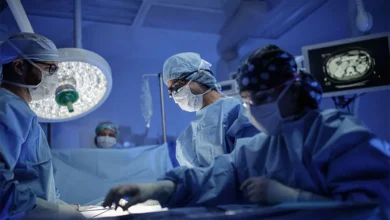6 Signs You Should See A Gastroenterologist

Everybody experiences gastrointestinal problems from time to time. Whether it is stomach flu, or heartburn after eating spicy food, most individuals are familiar with common digestive problems like nausea and vomiting, constipation, and diarrhea. However, some gastrointestinal issues require specialist care with a practitioner known as a gastroenterologist. A gastroenterologist is a physician who is skilled at diagnosing and treating conditions of the gastrointestinal tract.
Dr. Bharat Pothuri can address conditions affecting your intestines and stomach, as well as other parts of your digestive tract, including the esophagus, pancreas, bile ducts, anus, and more. Here are 6 common signs that you should see a gastroenterologist.
- Swallowing Is Becoming Difficult or Painful
If you frequently experience pain or difficulty swallowing or feel as if food is ‘lodged” in your chest or throat, you should contact a gastroenterologist. You might be suffering from dysphagia, particularly if you are also experiencing hoarseness, coughing, hiccupping, or feeling full only after several bites of your meal. Untreated dysphagia can result in choking, dehydration, malnutrition, and sometimes aspiration pneumonia.
- You Have Changes in Bowel Habits
Nobody likes to talk about their bowel movements. However, changes may signify an issue. Diarrhea, narrowing of stools, constipation, or changes in consistency or frequency of bowel motions require a visit to the gastroenterologist. Your doctor will provide a comprehensive diagnosis to establish if these issues stem from a problem within your digestive tract, and suggest the best care plan.
- You Have a Persistent Heartburn or GERD
Heartburn is a burning sensation in the middle of your chest. This discomfort generally happens once stomach acid moves up into the esophagus. Generally, heartburn stems from irritants like spicy foods, cigarettes, and alcohol.
Occasional heartburn is not a reason for concern. However, if you experience persistent heartburn, accompanied by symptoms like shortness of breath, difficulty swallowing, and dizziness, it could indicate a more serious condition like gastroesophageal reflux disease (GERD).
- There is Blood In Your Stool
Bleeding is not normal. Therefore, you should visit a gastroenterologist if you notice blood in the toilet or on the toilet paper, or if you often have abnormally dark, tarry stools. The most prevalent cause of bleeding is hemorrhoids, which are easily treatable. However, your bleeding could also indicate serious concerns like ulcers, polyps, lesions, or inflammatory bowel disease.
- You Experience Unexplained Weight Loss
If you drastically lose weight, you should visit a gastroenterologist for an examination. Some weight loss could be attributed to diet changes or exercise, but drastic weight loss is abnormal. Digestive problems could be responsible for this unexplained weight loss as they affect your body’s capability to absorb nutrients and calories. Other common causes of sudden weight loss involving the digestive tract include chronic pancreatitis, ulcerative colitis, cirrhosis, peptic ulcers, and Crohn’s disease.
- You Have Jaundice
Jaundice is the yellowing of the skin, often resulting from a condition affecting the liver. Conditions like hepatitis, liver cirrhosis, and more affect the liver’s functionality, causing an increased level of bilirubin in the blood, which causes the yellowing of your skin. Careful assessment and treatment of these conditions help avoid liver failure, infection, or permanent liver damage. Therefore, talk to your gastroenterologist about your concerns.
Your digestive system is crucial to how effectively you absorb nutrients into your body from the food you consume. Therefore, if you have issues with your digestive tract, it can be quite daunting. Do not hesitate to consult a gastroenterologist if you notice any of the symptoms highlighted above.
If left untreated, these concerns can result in more serious complications. Your doctor will perform the necessary diagnostic tests to identify the underlying cause of your condition and suggest the most appropriate care plan.




